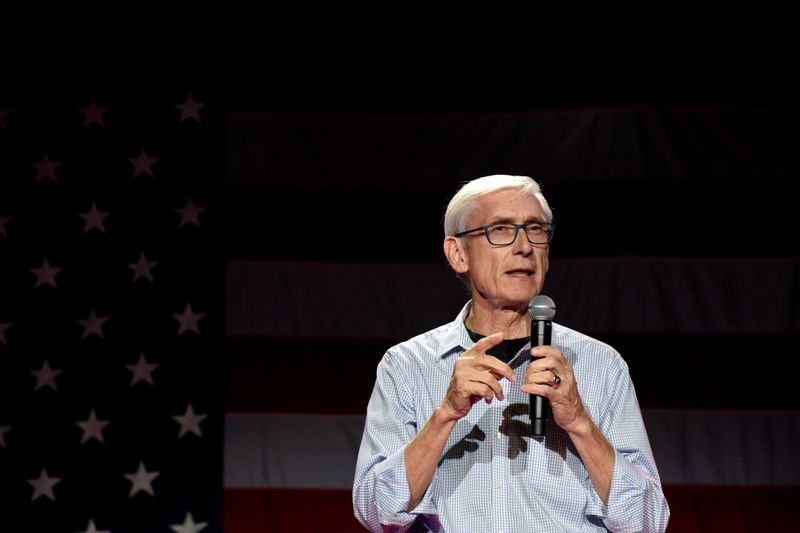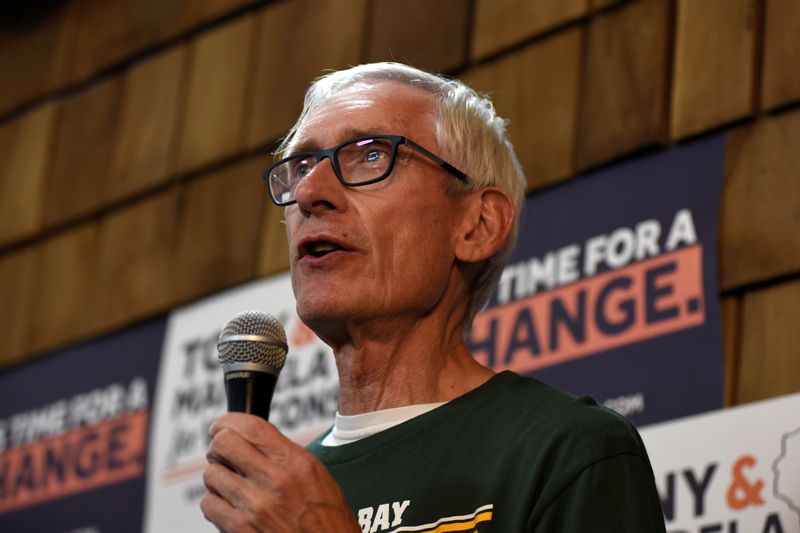By John Whitesides and Joseph Ax
(Reuters) - The Wisconsin Supreme Court put the state's chaotic presidential primary back on track, ruling on Monday that Democratic Governor Tony Evers cannot postpone in-person voting to June despite the coronavirus crisis.
Evers had moved earlier in the day to postpone the primary election from Tuesday until June 9, citing health risks from the coronavirus pandemic, but Republicans quickly filed a legal challenge in the state Supreme Court.
In a separate lawsuit brought by the Wisconsin Republican Party, the U.S. Supreme Court voted 5-4 to overturn a federal judge's decision extending the time for absentee voting until next week, meaning only absentee ballots postmarked by Tuesday will be counted.
The legal action means Wisconsin voters will head to the polls on Tuesday to vote in the primary, as well as state and local elections, despite orders to stay at home and a ban on public gatherings to limit exposure to the virus, which has killed more than 10,000 people nationwide and infected more than 350,000.
Republicans argued Evers did not have the authority to postpone the election and accused him of "unconstitutional overreach."
"The state’s highest court has spoken: the governor can’t unilaterally move the date of the election," Republican Assembly Speaker Robin Vos and Senate Majority Leader Scott Fitzgerald said in a joint statement after the court ruled 4-2 in favor of their motion to block Evers.
"This election will proceed as planned," they said.
In the U.S. Supreme Court ruling, the court's conservative majority said the federal courts should not alter rules on the eve of an election.
Justice Ruth Bader Ginsburg, writing for the minority, said it could lead to "massive disenfranchisement" in Wisconsin given the explosion of demand for absentee ballots.
A record of nearly 1.3 million absentee ballots had been requested but only about 725,000 had been returned by Monday, the Wisconsin Elections Commission said.
PUBLIC SAFETY
Evers described his order as a last-ditch effort at preserving public safety after the Republican-controlled legislature rejected his call last week to cancel in-person voting on Tuesday and extend the time to return absentee ballots into late May.
Evers said last week he did not have the authority to move the election on his own, but his order relies on a state law that says during an emergency the governor can issue orders to protect the security of people and property.
"I cannot in good conscience allow any types of gathering that would further the spread of this disease and to put more lives at risk," Evers told reporters on a conference call after issuing the executive order. "There is not a sufficiently safe way to administer in-person voting tomorrow."
Some state officials have warned of potential chaos if the voting goes ahead.
Concerns about the coronavirus have left nearly 60% of the state’s municipalities with a shortage of poll workers, causing the consolidation of many polling sites, and more than 100 without staff for even one polling site.
The Wisconsin Army National Guard was set to help at the polls.
More than a dozen states have responded to the coronavirus pandemic by delaying or adjusting their primaries in the Democratic race to pick a challenger to Republican President Donald Trump in the Nov. 3 election.
Democrats in Wisconsin have criticized Republicans for trying to force the vote to go forward. Republicans have cited the potential for voter fraud and the short timeline to fill thousands of state and local offices that are also on the ballot.

Democrats say Republicans want to dampen turnout in state races, particularly for a seat on the Wisconsin Supreme Court that could be instrumental in ruling on future voting-rights cases in the battleground state crucial to November's election.
